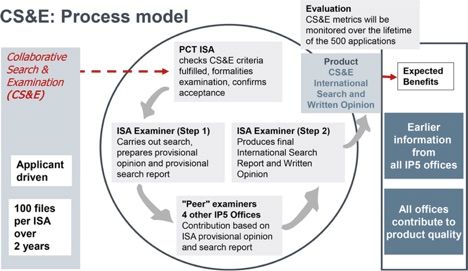
Traditionally, when an International Patent Application is made through Patent Cooperation Treaty (PCT), international searches and examinations are carried out by International Search Authority (ISA) or International Preliminary Examining Authority (IPEA). The National Office of a country is generally granted the status of ISA/IPEA which performs an international search for prior art and issues report regarding the patentability of the claims of the application. The written opinion serves as a good predictor for the patentability of the applicant's invention. The applicant, based on this report, can either request for examination and proceed with the national phase or hold off any further proceedings.
Over the years, the IP5 Offices (which consist of the European Patent Office (EPO), the Korean Intellectual Property Office (KIPO), the Japan Patent Office (JPO), the State Intellectual Property Office of the People's Republic of China (SIPO) and the United States Patent and Trademark Office (USPTO)) have endorsed a new framework wherein the examiners from each of the IP5 offices collaborate for the establishment of a consolidated international search report and the written opinion under PCT Chapter I, which, although remaining the opinion of the chosen International Searching Authority, is based on contributions from the participating offices. In doing so, the IP5 offices aim at establishing a higher quality of search report and written opinion. After successful two pilot projects, the IP5 offices announced the Collaborative Search and Examination (CS&E), a third pilot project which would be operational from 1st July 2018. The IP5 offices head into this pilot project with the view to assessing the users' interest for such a new PCT product and the expected efficiency gains for the participating offices.
Framework
In order to ascertain the user's interest in project, the applications which shall be examined in the CS&E project shall be selected by the applicants themselves. The applicant's can participate in the project by filing a standard participation form together with the international application with the receiving Office of one of the IP5 offices or the International Bureau of the World Intellectual Property Organization (WIPO).
The main ISA would then perform the search and examinations in a manner no different from an ordinary international application. Unlike the traditional ISA search, the search report and the written opinion will only be a provisional work product, which shall be redirected to other peer-ISA where additional searching would be conducted to the necessary extent. Each peer-ISA would then transmit their contributions to the main ISA, where final search report and the written opinion would be prepared in light of these contributions.
Currently, the applicants can participate in the pilot project with no additional costs, other than the standard fee for a PCT search at the competent ISA while providing the applicant with a higher quality of the search and greater legal certainty. This way, the project presents a good opportunity for applicants to ascertain the patentability of their inventions in different countries, that too in a much earlier stage of the application with no additional costs. The applicant, with the opinion of 5 different ISAs, will get a clearer picture as to the patentability of his/her invention and can decide upon whether to proceed with the national phase, and if so in which countries. The ISAs, on the other hand, will benefit from CS&E by improving the quality and efficiency of the international search and examination of the applications. The offices also benefit from the creation of a set of common quality and operational standard while processing the applications. This way, the efficacy of the search report and the written opinion will improve, which would in turn improve the protection of patents as a whole.
With two pilot projects with encouraging feedback, the IP5 offices heads with an optimistic outlook to the third pilot, which may potential change the existing framework and in-turn the IP dynamics.
The content of this article is intended to provide a general guide to the subject matter. Specialist advice should be sought about your specific circumstances.

